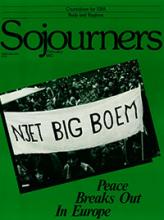The sound of marching feet in Europe has again reached American ears. But this time Europeans are marching for peace. The outbreak of peace is transforming European politics and causing increasing concern in the United States, a superpower now more comfortable with the arms race than with talk of peace.
Three years ago Europeans were virtually silent on the question of nuclear war. I remember being told by English friends, "It's an American issue, not ours. Anyway, there is nothing we could ever do about it here."
Now, as this issue of Sojourners reports, an increasingly popular movement against nuclear weapons is moving across Europe. Its leaders talk of a "nuclear-free zone" stretching from one end of Europe to the other and serving as a buffer zone between the two nuclear superpowers, the United States and the Soviet Union.
Many factors are involved in the dramatic shift in European public opinion. The complete lack of progress in U.S.-Soviet arms negotiations, matched with massive new military buildups by both sides, is key. The dangerous change in nuclear policy from deterrence to "first strike" technologies and doctrines adds greatly to European insecurity. And the statements of the Reagan administration in particular about fighting and winning "limited" nuclear wars have been frightening to people in Europe.
Read the Full Article

